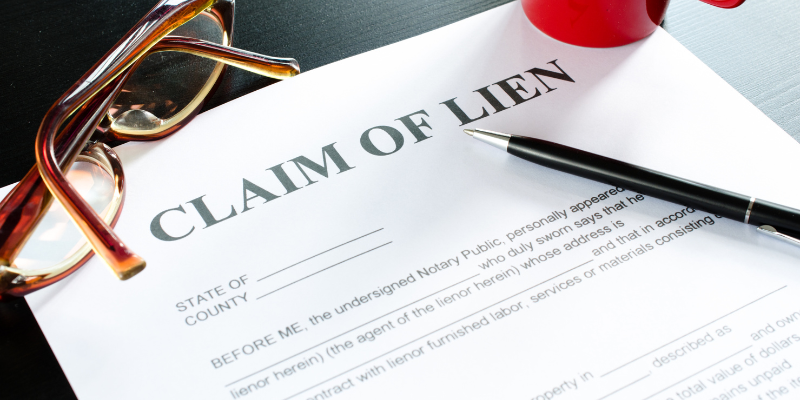
The prospect of selling a house can be an exciting yet complex endeavor. For some homeowners, however, the process of a traditional sale can become even more intricate when there’s a lien attached to the property. In this comprehensive guide, we will delve into the world of property liens, understanding their implications, and learning how to navigate the process of selling a house with a lien.
In Today’s Article:
- 1.What is a Lien?
- 2.Common Types of Property Liens
- 3.How Do You Do a Property Lien Search?
- 4.Is There a Statute of Limitations on Property Liens?
- 5.What Happens if You Don’t Pay a Property Lien?
- 6.Can You Sell a House With a Lien On It?
What is a Lien?
At its core, a lien is a legal claim or encumbrance on a property that serves as collateral for a debt or obligation. This claim can arise from various circumstances, such as unpaid property taxes, outstanding loans, or disputes over services rendered. Essentially, a lien provides creditors with the right to seize the property in the event of non-payment, making it a significant factor to consider when selling a house.
Common Types of Property Liens
There are two fundamental categories of property liens: voluntary and involuntary. A voluntary lien is one that you willingly enter into, such as a mortgage agreement. On the other hand, an involuntary lien is typically imposed when there is an outstanding debt, as seen with a mechanic’s lien, IRS tax lien or property tax lien.
Mortgage Liens
One of the most common types of liens is the mortgage lien. When a homeowner borrows money to purchase a property, the lender places a mortgage lien on the property. This lien ensures that the mortgage lender has a claim to the property until the mortgage is fully paid off.
Mechanic’s Liens
Another prevalent type of lien is the mechanics lien. This type of lien is filed by contractors, subcontractors, or suppliers who have provided labor or materials for property improvements. Mechanics liens aim to secure payment for the services rendered.
Property Tax Liens
Property tax liens are imposed by local governments when homeowners fail to pay their property taxes. These property liens serve as a means for governments to recover the unpaid taxes by potentially auctioning off the property.
Judgment Lien
Judgment liens result from court judgments in favor of a creditor. If a homeowner loses a lawsuit and is ordered to pay a monetary judgment, the creditor may place a lien on the homeowner’s property as a way to ensure payment.
Home Owner’s Association Liens
Homeowners’ Association (HOA) liens arise when homeowners fail to pay their HOA dues or assessments. An HOA lien is typically placed on the property to secure the outstanding payments.
IRS Liens
The Internal Revenue Service (IRS) can place a lien on a property if a homeowner has unpaid federal taxes. An IRS tax lien gives the government a claim to the property until the tax debt is settled.
Is it Bad to Have a Lien on Your House?
Having a lien on your house can have significant implications for your ability to sell the property. Prospective buyers may be wary of purchasing a home with a lien, as it can complicate the transfer of ownership and potentially lead to legal issues.
Additionally, a lien can affect your credit score and make it more challenging to secure favorable financing terms. The presence of a lien can create a cloud on the property’s title, causing uncertainty and potential delays during the closing process.
How Do You Do a Property Lien Search?

Before selling a house, it’s crucial to conduct a property lien search to identify any existing liens on the property. This can typically be done by working with a title company or conducting research through the local county clerk or county records office. A thorough lien and title search also helps uncover any outstanding debts or claims that need to be addressed before proceeding with the sale.
What Happens if There is a Lien on A House That is Not Mine?
In some cases, a lien might be attached to a property that is not owned by the individual responsible for the debt. This can occur due to errors or mistaken identity. If you discover a lien recorded on your property that does not belong to you, it’s essential to take immediate steps to rectify the situation, such as contacting the relevant authorities or seeking legal counsel.
How Can I Prevent a Lien on My Home?
Preventing a lien on your home involves practicing responsible financial management and staying proactive in addressing potential issues. To minimize the risk of liens, make sure to pay your bills on time, keep accurate records of transactions, and resolve any disputes promptly. Additionally, staying informed about your rights and responsibilities as a homeowner can help you avoid unforeseen lien situations.
Is There a Statute of Limitations on Property Liens?

Liens generally have a statute of limitations, which determines the maximum amount of time during which a creditor can enforce their claim for unpaid debt. The specific length of the statute of limitations can vary based on the type of lien and the jurisdiction. Once the statute of limitations expires, the lien may become unenforceable. Addressing existing liens before listing is crucial, as different liens have varying statutes of limitations – mortgage liens can last up to 20 years, mechanics liens around one to six years, and property tax liens five to ten years. Understanding these limitations and seeking professional guidance can facilitate a smoother sale process.
Other Articles You Might Enjoy:
- Messy Title Problems in Texas: What Every Homeowner Needs to Know
- Understanding HOA Liens in Texas: What You Need to Know
- Understanding Types of Liens: How They Impact Home Sellers
- Selling a House with Delinquent Taxes Or Property Tax Liens?
- Selling Your House with Property Taxes Owed: What You Need to Know
What Happens if You Don’t Pay a Property Lien?
Failure to pay a property lien can result in serious consequences, including legal actions taken by the lienholder. Depending on the type of lien, the creditor may pursue options such as foreclosure, auctioning the property, or obtaining a court judgment against the property owner or homeowner.
What If I Don’t Have the Money to Pay a Lien Before Selling the Home?
If you find yourself in a situation where you lack the funds to pay off a lien before selling your home, there are several strategies you can explore. Negotiating with the lienholder for a reduced payoff amount or setting up a payment plan could provide a pathway to resolving the debt and proceeding with the sale.
Can You Sell a House With a Lien On It?

Yes, it is possible to sell a house with a lien or judgment on it, but the process can be more complex compared to selling a lien-free property. To successfully sell a house with a lien, you will need to address the lien by either paying it off, negotiating with the lienholder, or using the proceeds from the home sale to satisfy the debt.
What If I Don’t Have Enough Equity in the Home to Cover the Lien?
In cases where the outstanding lien amount exceeds property value or the equity in the home, selling the property can be more challenging. Options include negotiating with the lienholder to accept a lesser amount as full satisfaction of the debt or seeking legal advice to explore potential solutions.
5 Ways to Prevent Title Issues and Closing Delays
To ensure a smooth closing process and avoid title issues when selling a house with a lien, consider the following steps:
- Conduct a Thorough Title Search: Prior to listing your property, perform a comprehensive lien or title search to identify any liens recorded against the property that need to be addressed.
- Resolve Liens Early: Address any outstanding liens well in advance of the closing date to prevent delays and uncertainties.
- Communicate with Stakeholders: Maintain open communication with all parties involved in the transaction, including the lienholders, buyers, real estate agents, and attorneys.
- Work with Professionals: Enlist the expertise of experienced real estate agents, title companies, and attorneys who specialize in dealing with properties with liens.
- Provide Full Disclosure: Ensure complete transparency by disclosing any existing liens to potential buyers, setting realistic expectations from the outset.
Does It Make Sense to Sell As-Is?
Selling a house with a lien may lead homeowners to consider selling the property “as-is.” While this approach can expedite the sale, it’s crucial to weigh the potential trade-offs, such as receiving a lower offer price. Selling as-is could be a viable option if addressing the lien and making repairs would be financially burdensome. If you are considering selling the house as is with the lien in place consider TX Cash Home Buyers cash offer program.

TX Cash Home Buyers Gives Multiple Offer Options!
Unlock the potential of your home with our multiple offer options. Discover what you qualify for and make informed decisions with confidence.
Navigate the Route to a Smooth Closing
Successfully selling a house with a lien requires careful planning, diligent research, and proactive communication. By understanding the nuances of different types of liens and taking the necessary steps to address them, homeowners can navigate the path to a successful and seamless closing.
Final Thoughts on Selling a Home With a Lien
In the realm of real estate transactions, dealing with liens can introduce complexities and uncertainties. However, armed with the knowledge and strategies outlined in this guide, homeowners can confidently approach the process of selling a house with a lien. By proactively addressing liens, engaging with professionals, and maintaining clear communication, homeowners can overcome obstacles with house liens and achieve a successful home sale that benefits all parties involved.
Disclaimer:
The content provided on this blog is for informational purposes only. We are not attorneys or tax professionals. For personalized legal or tax advice, please consult with a qualified professional.
Written by Lisa Martinez, Founder of TX Cash Home Buyers

About The Company
TX Cash Home Buyers helps Texas homeowners sell quickly and simply — even in tough situations like repairs, inherited homes, or financial stress. Founded by Lisa Martinez, we’re known for our local experience, fair offers, and commitment to guiding sellers through off-market sales with clarity and care.




